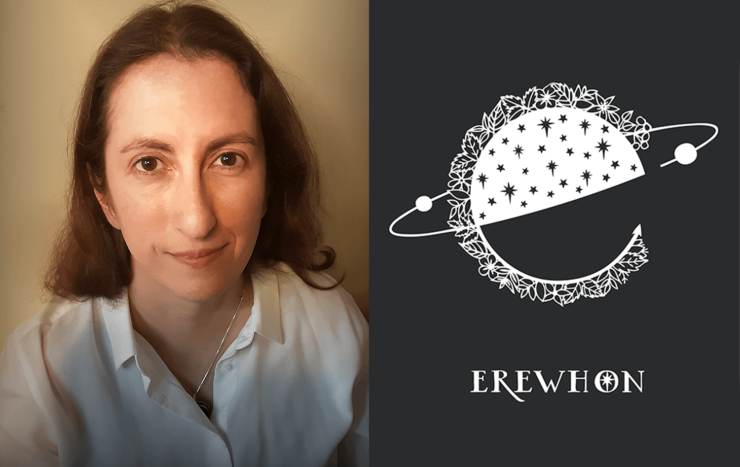We are pleased to announce the acquisition of The Pomegranate Gate by Ariel Kaplan by Erewhon Books. The novel is an exquisite fantasy, in the vein of Naomi Novik or Katherine Arden, based on Jewish folklore and set in a mythical version of Spain at the time of the Inquisition. The Pomegranate Gate will be published in Winter of 2023.
Three things about Toba Peres are strange: she can speak but she can’t shout; she can walk but she can’t run; she can write faster than she can speak, in multiple languages, with both hands at the same time. Three things about Naftaly Cresques are strange: every time he dreams, he dreams of square-pupiled strangers in a magical world; when awake, he sometimes sees things that aren’t real; and his family has passed down to him a book, seemingly of nonsense words, which he knows it’s essential never to lose and never to read.
One thing Toba and Naftaly share in common: they are forced to leave their home in the city of Rimon after the Queen of Sefarad orders all Jews to leave the country or convert. Driven off the road by a bandit, Toba stumbles through a magical gate in an unseasonable pomegranate grove on the night of the full moon, and finds herself in the world of Maziks: mythical square-pupiled immortals. With nowhere else to go, she follows a pair of Maziks—a taciturn academic and an orange-eyed rogue—back to the ruined castle where they live alone, until a dangerous chance encounter reveals the cause of Toba’s strangeness: she is half-Mazik, the child of a mortal mother and a Mazik father. And, as such, her existence is forbidden by Mazik law and she is a target of La Cacería, the Mazik Inquisition—which is also hunting for an ancient lost book of mysterious power.
Naftaly, left behind at the gate, leaves the pomegranate grove to find himself fifty miles off course, with no money, no food, and only the company of an old woman who followed him into the woods. But Naftaly’s problems are only beginning: he learns the Inquisition isn’t allowing books out of the country, and he seems to be falling for the handsome orange-eyed Mazik who haunts his dreams—a Mazik whose identity will place all of them in danger from La Cacería.
To survive, Toba and Naftaly will have to uncover secrets about magic, myth, and how Toba’s parentage and Nafaly’s book are tied to an ancient conflict in Mazik history, the mythical lost city of Luz, and the mysterious connection by which events in the human world are reflected in the realm of Maziks.
From the author, Ariel Kaplan:
I was given a copy of Howard Schwartz’s book Elijah’s Violin and other Jewish Fairy Tales when I was very young, and have been devouring Jewish folklore ever since. Many of my favorite stories are about demons—not the icky, baby-eating variety, but the terrifying yet civilized creatures living in a dark mirror to the human world. We see them described in different ways depending on where and when the story originated: they can be repulsive or beautiful, human-shaped or wraith-like, good or terrible, but what remains constant is that they are, like humans, a people of laws and ethics. And their world is both set apart from ours and inextricably linked to it, accessible to humans who wander through or are lured there, through some unseen nexus that holds the worlds together.
I wrote The Pomegranate Gate over the course of about two years, pulling from the Jewish fairy tales I loved as a kid—about demons, good and bad, the mythical hidden city of Luz, and the giant bird called the Ziz. I wove these elements together with the Sephardi history I began studying in earnest back in college, where I majored in History and Religious Studies with a particular interest in Medieval Spain, itself a nexus of learning and culture.
It’s a story featuring so many of my favorite things: clever underdogs, good-hearted fools, angry old women, and magic that doesn’t always do what you want, while exploring themes of power and oppression and found family. I’m eager to start working creatively with Sarah Guan and the rest of the team at Erewhon on the series.
From Sarah Guan, Senior Editor at Erewhon:
I’ve always wanted to believe that there were worlds just beyond our own—whether they were found inside closets, like Narnia, or alternate universes, as provided by quantum mechanics. Some of the best stories in the cultural consciousness have involved the intersections of those worlds with our human one, and the incisive reflection of all our greatest triumphs and darkest secrets through this fantastical lens. It’s no surprise that many cultures have developed their own mythos around mirror worlds, and that those folktales have proved fruitful for novelists over the years.
When I first read The Pomegranate Gate, I was struck by both Ariel’s loving homage to this storied tradition and the dazzling ways she has transformed the genre—historically adjacent portal fantasy—for a modern readership. It’s chock-full of all my very favorite elements of fable and myth, but manages to convey fresh truths about how our world—and all worlds—work. I’m incredibly excited to help bring this story to readers everywhere.
Ariel Kaplan is the author of three highly-regarded young adult contemporary novels from Knopf Children’s. This is her first foray into adult fantasy.










